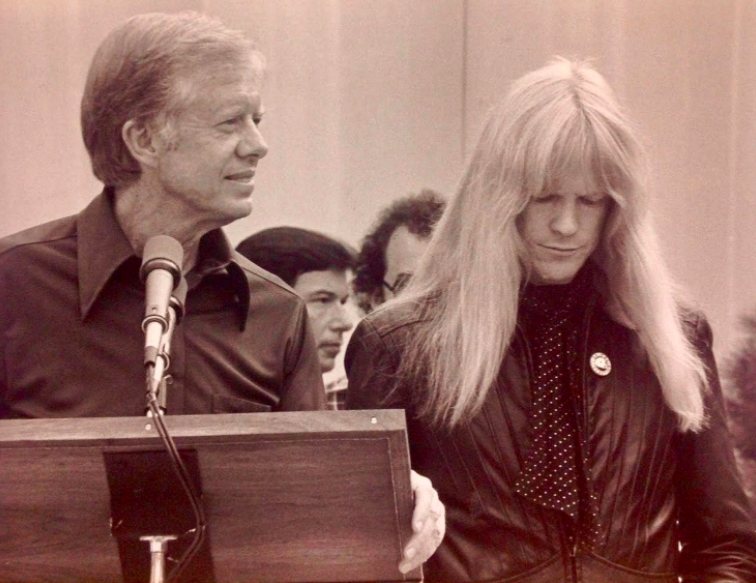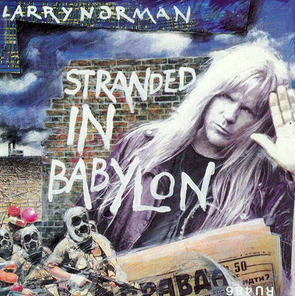March 23, 2018
I Wish We’d All Been Ready
I loved Larry Norman. The Jesus Movement godfather was the spirt and soul of the Boomer-led shift away from political conservatism and religious fundamentalism that were features of the US church back in the 60s.
And he was a huge music figure even outside the world of Christian music. There’s a great photo of him in hospital when, terminally ill, his good friend Black Francis from The Pixies visited him. They’re laughing together. You can see the affection. Would love to have heard that conversation!

Larry Norman with some short haired bloke
I got to a Norman gig in a small hall in Belfast years back. He called out “Any requests?” to which one Ulster wag yelled “Cut yer hair!”, to which Norman then retorted “What did you want to step outside and say to me?”
He then sat down at a piano, flicked back that leonine hair and proceeded to blow us away with the plaintive falsetto wail and songs such as One Way, and UFO. Apart from his crazy pre-millennialism I could find no fault!
Loved that guy, and there’s an interesting article on him in The Washington Post this week, by Greg Thornbury, who has also written a book this year on the Christian rock scene (its dangers mostly!).
The gist of the article is that well before the Moral Majority took over the reins of the evangelical movement in the USA, the Jesus Movement had a chance of being the apolitical, non-power-hungry Christian shapers of evangelicalism.
As Thornbury notes, Norman and his ilk offered a path to purity for the sixties generation of church going young people whom the Sexual Revolution had enticed. There was a hope that this could be the future of theologically conservative Christianity in the US, at least for the Boomer generation.
Of course it wasn’t to be. One wonders what Norman (who died ten years ago), would have made of the current political US context and the confusion and contortion that evangelicalism has found itself in by tying itself so tightly to it.
He certainly wrote more stridently about the state of the church as the years went on. One of my favourite Norman albums is 1991’s Stranded in Babylon, which I listened to on high rotation long before I wrote anything about Babylon.

And how about these lyrics from God Part III?:
I don’t believe in beatles, i don’t believe in rock
I don’t believe in the cutting edge, that’s just journalist talk
I don’t believe in the cover story or the gospel chart
You can easily hit number one with a bullet and totally miss the heart
But i oh i believe in GodI don’t believe in politics while the masses stay unfed
Til the leaders change priorities and supply the poor with bread
Don’t believe in the revolution or the empty words of peace
You can tear all of the governments down you still won’t find release
But i oh i believe in God
Here’s a man who has seen it all and is weary. He’s clinging to the only Person left to believe in. He’s weary of the hype, the hollowness, the broken promises, and the hypocrisy of the industry he spawned, that took on a sordid life of its own.
Perhaps his song Letters To the Church from his 1989 album Home at Last most clearly reveals the state of ecclesiastical play as the nineties beckoned:
Everytime I see you, you know I start to cry
I know what you’re doing, and that you’re living a lie
And Jesus is waiting outside your door
But you don’t love Him like before
And you don’t listen anymoreYou speak of compassion, but you don’t really care
You can talk of heaven, but are you going there?
God’s trying to touch you but you’re out of reach
And you don’t practice what you preachI know the shadows you seek;
I know the places you’re weak
You’ve run away, and you’re looking so much older
Won’t you please stop and pray, and your spirit’s getting colder
Let him take the weight off your shoulderYou seek after fortune, and you live for yourself
You stand in the spotlight and leave God on the shelf
You smile, you gesture, each hair is in place
But I can see behind your face
The sorrow you can’t erase
Norman had a sly wit, a sharp mind and it all belied a deep sorrow. He was a Jeremiah figure speaking to God’s people, whose lyrics became more pointed the more his voice faded from mainstream conscience.
Of course he was not perfect, and his own relational life got complicated, but there was an energy and zeal about him that he carried, even when, at the best the edges had been burred off his fellow Jesus Movement travellers, or they’d given up the faith altogether.
By the time he wrote those lyrics about the church the gospel music scene was a billion dollar sub-cultural evangelical juggernaut filled with saccharine pop-stars, and cassette tapes of Christian artists with stickers that said “Sounds like…” before listing the naughty secular artists the good clean living types were copying.
That so many of those clean living types were subsequently sprung for having lifestyles exactly the same as those naughty artists merely drives home Norman’s point all the more.
The one thing that the Jesus movement that Norman and his cohort could not shape was a new ecclesiology within which to embed it. Their very rationale was suspicious of institution, as movements generally are, so that’s to be expected. After all, an institution implies a lack of movement, so movements shy away. And rolling stones gather Grammys, but not the moss and lichen of ancient sandstone institutions.
Hence when the Moral Majority took over the reins in the 80s, and drove much of the public face of evangelicalism, they were will funded, well connected and had a church base to work from, whereas the likes of Norman couldn’t build any lasting platform, and I suspect they never had the desire to, nor the support base even if they had.
Not that God’s church has not had its faithful people the world over – and even the West over. And not that fresh shoots have not been springing up, even as the secular frame strengthens its grip and the evangelical movement, particularly in the US, finds itself under pressures of its own making.
But just re-read those damning lyrics from Letters To The Church again. They’re a searing indictment of where things were going for the church, weren’t they?
“Won’t you please stop and pray!” What a wonderful antidote to the almost crazed activism of Right and Left in the church today.
Norman could see it all coming, and he was calling on us to all get ready. I wish we had been.
I look forward to reading Thornbury’s book.
If you’d like to support my writing then click here to find out how you can do so.
Written by
There is no guarantee that Jesus will return in our desired timeframe. Yet we have no reason to be anxious, because even if the timeframe is not guaranteed, the outcome is! We don’t have to waste energy being anxious; we can put it to better use.
Stephen McAlpine – futureproof
Stay in the know
Receive content updates, new blog articles and upcoming events all to your inbox.


